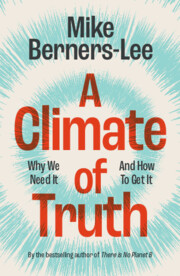Refine search
Actions for selected content:
267 results
6 - Evidence and Values in Continuous Distribution Design
-
- Book:
- Negotiating Values
- Published online:
- 30 November 2025
- Print publication:
- 18 December 2025, pp 121-159
-
- Chapter
- Export citation
Values and commitment in the innovation process in highly regulated and semi-public systems: The case of the four-day work week in German healthcare
-
- Journal:
- Journal of Management & Organization , First View
- Published online by Cambridge University Press:
- 05 November 2025, pp. 1-19
-
- Article
-
- You have access
- Open access
- HTML
- Export citation
Introduction
-
-
- Book:
- Science and Humanism
- Published online:
- 09 October 2025
- Print publication:
- 23 October 2025, pp 1-8
-
- Chapter
-
- You have access
- Open access
- HTML
- Export citation
Chapter 8 - The Pragmatic and the Religious Functions of Science
- from Part II - Inspirations
-
-
- Book:
- Science and Humanism
- Published online:
- 09 October 2025
- Print publication:
- 23 October 2025, pp 172-194
-
- Chapter
-
- You have access
- Open access
- HTML
- Export citation
Chapter 4 - Scientism: Reflections on Nature, Value, and Agency
- from Part I - Interrelations
-
-
- Book:
- Science and Humanism
- Published online:
- 09 October 2025
- Print publication:
- 23 October 2025, pp 81-104
-
- Chapter
-
- You have access
- Open access
- HTML
- Export citation

Science and Humanism
- Knowledge, Values, and the Common Good
-
- Published online:
- 09 October 2025
- Print publication:
- 23 October 2025
-
- Book
-
- You have access
- Open access
- Export citation
8 - Animal Rights and One Health
- from Part II - One Health and Contemporary Legal Structures
-
-
- Book:
- The Cambridge Handbook of One Health and the Law
- Published online:
- 25 September 2025
- Print publication:
- 09 October 2025, pp 104-122
-
- Chapter
- Export citation
Abstraction and Determination in Weinrib’s Reciprocal Freedom: The Dynamics of Backward-Looking and Forward-Looking Deliberation in Judging
-
- Journal:
- Canadian Journal of Law & Jurisprudence , First View
- Published online by Cambridge University Press:
- 09 September 2025, pp. 1-10
-
- Article
-
- You have access
- Open access
- HTML
- Export citation
6 - Exploring values
- from Part 2 - Leads Self
-
-
- Book:
- Leading and Managing Health Services
- Published online:
- 15 August 2025
- Print publication:
- 28 August 2025, pp 66-76
-
- Chapter
- Export citation
Teaching value-based participatory design of complex socio-technical systems
-
- Journal:
- Proceedings of the Design Society / Volume 5 / August 2025
- Published online by Cambridge University Press:
- 27 August 2025, pp. 3011-3020
-
- Article
-
- You have access
- Open access
- HTML
- Export citation
The Value of Values for Autocrats: Traditional Morality and Putin’s 2020 Term-Limit Contravention
-
- Journal:
- Perspectives on Politics , First View
- Published online by Cambridge University Press:
- 25 August 2025, pp. 1-16
-
- Article
-
- You have access
- Open access
- HTML
- Export citation
Chapter 1 - Making Humanities and Social Sciences come alive: The significance of curriculum in education
- from Part I - Humanities and Social Sciences curriculum
-
-
- Book:
- Making Humanities and Social Sciences Come Alive
- Published online:
- 02 August 2025
- Print publication:
- 14 August 2025, pp 2-15
-
- Chapter
- Export citation
Chapter 20 - Values and social justice education
- from Part V - HASS for all learners
-
-
- Book:
- Making Humanities and Social Sciences Come Alive
- Published online:
- 02 August 2025
- Print publication:
- 14 August 2025, pp 340-354
-
- Chapter
- Export citation

Human Cognitive Diversity
-
- Published online:
- 05 August 2025
- Print publication:
- 04 September 2025
-
- Element
- Export citation
3 - The Legitimacy–Law Nexus
- from Part I - Setting the Stage
-
- Book:
- The Law and Politics of International Legitimacy
- Published online:
- 14 July 2025
- Print publication:
- 24 July 2025, pp 39-46
-
- Chapter
- Export citation
14 - International Legitimacy as a System of Reference and Meaning
- from Part V - International Legitimacy and Change
-
- Book:
- The Law and Politics of International Legitimacy
- Published online:
- 14 July 2025
- Print publication:
- 24 July 2025, pp 259-282
-
- Chapter
- Export citation
Charismatic State Building: The Reform of SUNAT in the Early 1990s
-
- Journal:
- Latin American Research Review ,
- Published online by Cambridge University Press:
- 04 July 2025, pp. 1-19
-
- Article
-
- You have access
- Open access
- HTML
- Export citation
Inferring welfare from inconsistent choices: how values matter
-
- Journal:
- Economics & Philosophy , First View
- Published online by Cambridge University Press:
- 19 May 2025, pp. 1-24
-
- Article
-
- You have access
- Open access
- HTML
- Export citation

A Climate of Truth
- Why We Need It and How To Get It
-
- Published online:
- 27 March 2025
- Print publication:
- 27 March 2025
5 - The Core of the Polycrisis
-
- Book:
- A Climate of Truth
- Published online:
- 27 March 2025
- Print publication:
- 27 March 2025, pp 125-133
-
- Chapter
- Export citation
